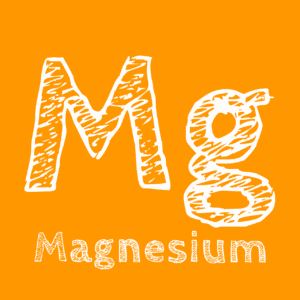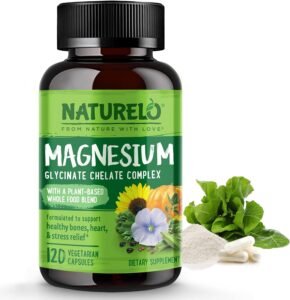Do you often feel worried, tense, or uneasy? You’re not alone. Anxiety affects millions of Americans. Many turn to natural supplements like magnesium glycinate for help.
Magnesium glycinate is a special kind of magnesium. It’s easy for the body to use and helps calm the nervous system. When combined with glycine, it can make you feel more relaxed, help you sleep better, and ease anxiety. But how does it work and why is it a good choice for anxiety?
Key Takeaways
- Magnesium glycinate is a form of magnesium that’s easily absorbed by the body and combined with the calming amino acid glycine.
- Supplementing with magnesium glycinate may help regulate neurotransmitters, reduce stress hormone levels, and promote relaxation – all of which can benefit those struggling with anxiety.
- Magnesium glycinate is generally well-tolerated and has a lower risk of digestive side effects compared to other magnesium supplements.
- Magnesium glycinate should be part of a comprehensive approach to anxiety management, alongside other lifestyle changes and therapies.
- Consulting a healthcare provider is recommended before starting any new supplement regimen, especially for those with pre-existing medical conditions.
Introduction: The Importance of Magnesium for Anxiety
Magnesium is a key mineral that helps with many body functions. It supports muscle and nerve function, controls blood sugar, boosts immune health, and helps manage mood. It’s linked to anxiety because it affects neurotransmitters in the brain related to mood and mental health.
The Role of Magnesium in the Body and its Potential Benefits for Mental Health
Studies show magnesium can help control stress hormones, which can lessen anxiety. Stress can also lower magnesium levels, leading to deficiency. Many studies suggest magnesium supplements can help those with anxiety.
- A study found that dietary magnesium intake in a French adult population ranged from 321mg to 328mg.
- Another study indicated that dietary magnesium may reduce the risk of incident hypertension among middle-aged and older US women, with a 10-year follow-up study showing a range from 1,616mg to 1,621mg.
- For women, a study suggested that dietary magnesium intake could impact plasma insulin levels and the risk of type 2 diabetes, with levels ranging from 59mg to 65mg.
- The association between magnesium intake and depression and anxiety in community-dwelling adults in the Hordaland Health Study found magnesium intake to be linked with a range from 45mg to 52mg.
Understanding magnesium’s role in mental health helps people find natural ways to improve their well-being. This can help reduce anxiety symptoms.
“Magnesium is essential for the proper functioning of the nervous system and plays a vital role in regulating mood and managing stress.”
How Magnesium Glycinate Can Help Reduce Anxiety
Magnesium glycinate is a special type of magnesium that combines with glycine, an amino acid. This mix helps magnesium glycinate get into the brain better than other types. It can directly affect brain function and mental health.
Glycine is calming and helps make GABA, a neurotransmitter that controls the nervous system. With magnesium and glycine together, magnesium glycinate can calm the nervous system. It can also improve mood and help you relax. This is great for people with anxiety.
The Unique Properties of Magnesium Glycinate
Magnesium glycinate is easy for the body to use because it’s very absorbable. Glycine helps carry magnesium into cells where it’s needed. This makes magnesium glycinate work better than some other supplements.
The glycine in magnesium glycinate also calms the brain and helps make more GABA. GABA stops too much brain activity and helps you relax. This makes magnesium glycinate a good choice for anxiety and brain health.
| Magnesium Glycinate Benefits | Magnesium Glycinate and Brain Health |
|---|---|
| Helps calm the nervous system Promotes relaxation and reduces stress Supports healthy sleep patterns Enhances mood and emotional well-being | Crosses the blood-brain barrier effectively Supports neurotransmitter balance Reduces inflammation in the brain Enhances cognitive function |
Magnesium glycinate is a great option for those wanting to manage anxiety naturally. It supports brain health. Always talk to a healthcare professional before starting magnesium glycinate supplements.
Check our review of Luma Nutrition Pure Magnesium Glycinate.
Magnesium’s Effects on Neurotransmitters and Stress Hormones
Magnesium is key to balancing neurotransmitters and stress hormones in your body. These elements greatly affect your anxiety levels. It helps control the activity of neurotransmitters like glutamate and GABA. When these get out of balance, you might feel more anxious.
Magnesium also keeps stress hormone cortisol in check. Cortisol is released when you’re stressed, but too much can make anxiety worse. By keeping cortisol levels healthy, magnesium helps you stay calm.
Studies link magnesium deficiency to stress-related issues like headaches and chronic fatigue. On the other hand, taking magnesium can reduce anxiety and improve sleep. It’s shown to help with panic, phobia, and attention issues too.
| Statistic | Relevance |
|---|---|
| More than 325 enzymes are magnesium-dependent, many of which are related to nervous system functions. | Magnesium’s crucial role in supporting neurological processes and maintaining a healthy nervous system. |
| Acute stress is linked to increased plasma magnesium levels and elevated urinary magnesium excretion. | Indicates the body’s response to stress can deplete magnesium levels, underscoring the importance of supplementation. |
| Magnesium inhibits the release of excitatory neurotransmitters and acts as a voltage-gated antagonist at the glutamate, N-methyl-D-aspartate (NMDA) receptor. | Demonstrates magnesium’s ability to regulate neurotransmitter activity and calm the nervous system. |
Magnesium works on key pathways to calm the nervous system. This makes it a great tool for managing anxiety and stress.
Magnesium Glycinate for Anxiety: Benefits and Potential Mechanisms
Magnesium glycinate is a special type of magnesium linked to glycine. It’s great for people wanting to ease their anxiety naturally. This combo has many benefits for managing anxiety.
Regulating Cortisol Levels and Promoting Relaxation
Magnesium glycinate helps lower cortisol, a stress hormone. High cortisol can make you feel anxious and tense. It can cross into the brain and affect neurotransmitters, keeping cortisol in check and making you relax.
Glycine in magnesium glycinate also helps reduce anxiety. It boosts calming neurotransmitters like GABA. Together with magnesium, it’s great for those looking for natural anxiety relief.
| Benefits of Magnesium Glycinate for Anxiety | Potential Mechanisms |
|---|---|
| Regulates cortisol levels | Magnesium glycinate can cross the blood-brain barrier and influence neurotransmitter production, helping to maintain healthy cortisol levels and induce a state of relaxation. |
| Promotes relaxation | The glycine component of magnesium glycinate has been shown to promote the production of calming neurotransmitters like GABA, further enhancing the supplement’s anxiety-reducing effects. |
“Magnesium glycinate’s unique properties make it a valuable tool for individuals seeking natural support for their anxiety.”
Magnesium glycinate tackles the root causes of anxiety, offering a natural way to manage it. It helps control cortisol and relaxes the body. This makes it a solid choice for those wanting to avoid traditional medicine side effects.
Magnesium Glycinate for Anxiety: Sources and Recommended Dosage
Magnesium is a key mineral found in foods like leafy greens, nuts, seeds, beans, whole grains, and dairy. Yet, many adults in the U.S. don’t get enough magnesium from food. For those looking to use magnesium glycinate for anxiety, a daily intake of 300-400 mg is often advised.
Start with a small dose of magnesium glycinate and increase it as needed. High doses can lead to diarrhea. When picking a supplement, choose a high-quality one that has been tested by a third party to ensure it’s pure and strong.
Talking to a healthcare provider before starting magnesium glycinate is a good idea, especially if you have health issues or take other medicines. This step helps make sure the supplement is safe and right for you.
“Magnesium is involved in hundreds of enzymatic reactions in the body, including those that regulate mood and anxiety levels.”
Research suggests that magnesium could help with anxiety. But, we need more studies to fully understand its benefits and risks. Always talk to a healthcare professional to find the right magnesium glycinate dosage for you.
Magnesium Glycinate for Anxiety: Potential Side Effects and Precautions
Magnesium is usually safe, but it’s good to know about possible side effects and precautions. This is especially true if you have health issues or take other medicines. Taking magnesium glycinate might cause loose stools or diarrhea, especially if you take a lot.
High amounts of magnesium can sometimes cause serious issues like low blood pressure, confusion, and muscle weakness. People with kidney problems might be more likely to have bad reactions to magnesium supplements. Always talk to your doctor before taking magnesium glycinate to make sure it’s safe for you.
Discussing Magnesium Supplementation with Your Healthcare Provider
Talking to your doctor about magnesium glycinate for anxiety is key. They can figure out the right dose for you and check if it’s good for your health. They’ll also tell you about any medicines you’re taking and other things you should watch out for.
Some people might be more sensitive to magnesium glycinate or have special needs that need extra care. Working with your doctor helps you find the right amount and make sure it’s safe and works well for your anxiety.
| Potential Side Effects of Magnesium Glycinate | Precautions for Magnesium Glycinate Use |
|---|---|
| Loose stools or diarrhea Low blood pressure Confusion Muscle weakness | Impaired kidney function Certain medical conditions (e.g., diabetes, liver disease) Interaction with medications (e.g., digoxin, sodium polystyrene sulfonate) Pregnancy and breastfeeding (consult healthcare provider) |
Always talk to your doctor about magnesium glycinate side effects, magnesium glycinate precautions, and any worries you have before starting a new supplement. Your doctor can make sure magnesium glycinate is safe and right for you.

Magnesium Glycinate for Anxiety in Combination with Other Strategies
Managing anxiety can be tough, but magnesium glycinate can help. It’s best used with other strategies for lasting relief. A holistic approach combines magnesium glycinate with lifestyle changes and therapy for better results.
Exercise can really help with anxiety. Try yoga, meditation, or a daily walk to calm your stress response. Relaxation techniques like deep breathing or muscle relaxation work well too.
Good sleep is key for managing anxiety. Magnesium glycinate works better with quality sleep. To improve sleep, limit screen time, stick to a sleep schedule, and make your bedroom sleep-friendly.
Don’t forget to seek help from mental health experts like therapists or counselors. They offer guidance and coping skills for your anxiety. They can also suggest treatments that go well with magnesium glycinate.
Using magnesium glycinate with other natural strategies and professional help can greatly improve your mental health. This approach leads to better overall well-being.
“Integrating magnesium glycinate with a range of evidence-based strategies can be a powerful way to address anxiety and promote long-term mental health.”
Magnesium Glycinate for Anxiety: Scientific Evidence and Research
Studies have looked into magnesium glycinate’s effects on anxiety. A 2022 study found that older adults taking 1.5-2 grams of magnesium L-threonate daily felt less anxious after 12 weeks. This type of magnesium can cross the blood-brain barrier.
A 2017 study showed that 248 mg of magnesium chloride helped with anxiety and depression. More research is needed, but these studies hint that magnesium glycinate could help manage anxiety. It might work by changing neurotransmitters, controlling cortisol, and helping with relaxation.
A 2017 review of 18 studies found magnesium supplements helped with anxiety and stress. But, the results were based on what people said. A 2019 study, however, showed magnesium taurate was quickly absorbed and reduced anxiety more clearly.
Experts say magnesium glycinate can calm stress and help with sleep. Nature Made Magnesium Glycinate is seen as the “best overall” supplement for its good absorption and easy on the stomach. Thorne Magnesium Bisglycinate is also a good choice for its absorption benefits.
Even with promising studies and expert advice, more research is needed to fully understand magnesium glycinate’s effects on anxiety. Always talk to a healthcare provider before starting any supplement to make sure it’s right for you.
| Supplement | Benefits | Recommended Dosage |
|---|---|---|
| Nature Made Magnesium Glycinate | Best overall absorption, gentle on stomach | Varies based on individual needs |
| Thorne Magnesium Bisglycinate | Known for absorption benefits | Varies based on individual needs |

Always talk to a healthcare provider before starting magnesium glycinate to make sure it’s safe and right for you.
Conclusion: Magnesium Glycinate as a Natural Anxiety-Relief Aid
Magnesium glycinate is a natural supplement that may ease anxiety. It combines magnesium’s calming effects with glycine’s soothing properties. This can help manage anxiety by balancing neurotransmitters, lowering cortisol, and promoting relaxation.
Studies show that magnesium glycinate and similar forms of magnesium can support mental health. They offer a natural way to ease anxiety. When paired with exercise, relaxation techniques, and counseling, magnesium glycinate can be key to managing anxiety and boosting well-being.
Looking into magnesium glycinate for anxiety relief and holistic management is smart. Adding it to your wellness plan could help you control your anxiety better. This could improve your life quality significantly.
FAQ
What is magnesium glycinate and how can it help with anxiety?
Magnesium glycinate is a special kind of magnesium that combines with glycine, an amino acid. This mix helps it get into the brain better. It can help you relax, sleep better, and manage anxiety.
How does magnesium influence anxiety and mental health?
Magnesium is key in controlling neurotransmitters and stress hormones. These can affect how anxious you feel. It balances out neurotransmitters and manages stress hormones like cortisol. This can calm your nervous system and help you feel more relaxed.
What makes magnesium glycinate a particularly effective form for addressing anxiety?
Magnesium glycinate is great for anxiety because it easily gets into the brain. It helps control cortisol and boosts calming neurotransmitters like GABA. Plus, glycine in it also helps reduce anxiety, making it more effective.
What is the recommended dosage for magnesium glycinate for anxiety?
For anxiety, take 300-400 mg of magnesium glycinate a day. Start with a small dose and increase as needed. Choose a high-quality supplement to ensure it’s safe and works well.
What are the potential side effects of taking magnesium glycinate?
Taking magnesium glycinate might cause loose stools or diarrhea, especially if you take a lot. High doses can cause low blood pressure, confusion, and muscle weakness. If you have kidney problems, be careful with magnesium supplements. Always talk to your doctor before starting.
How can magnesium glycinate be used in conjunction with other strategies for managing anxiety?
Magnesium glycinate works best with other strategies like exercise, deep breathing, and good sleep. Talking to mental health experts can also help you deal with anxiety. These methods together can make magnesium glycinate more effective.
What does the research say about the effectiveness of magnesium glycinate for reducing anxiety symptoms?
Studies show magnesium glycinate can help with anxiety. A 2022 study found it helped older adults feel less anxious after 12 weeks. A 2017 study also saw less anxiety and depression with 248 mg of magnesium chloride. These results suggest magnesium glycinate could be useful for anxiety.
Source Links
- Magnesium for Anxiety: Does It Work?
- Best Forms of Magnesium for Anxiety and Depression – SURUCHI CHANDRA M.D.
- Magnesium for Anxiety: How You Can Fight Anxiety and Feel Better
- The Effects of Magnesium Supplementation on Subjective Anxiety and Stress—A Systematic Review
- The Role and the Effect of Magnesium in Mental Disorders: A Systematic Review
- Does Magnesium for Anxiety Really Work?
- Tips and Uses for Magnesium Glycinate
- Magnesium for Anxiety: Does it Help? — Talkspace
- Magnesium and stress – Magnesium in the Central Nervous System
- Magnesium in neuroses and neuroticism – Magnesium in the Central Nervous System
- Could Magnesium Be The Answer to Reducing Anxiety?
- Magnesium May Help Reduce Stress and Anxiety, Plus 5 Other Benefits
- Magnesium for Anxiety: Effectiveness, Types, and Dosage
- Magnesium for Anxiety: Everything You Need to Know- K Health
- Magnesium glycinate: Benefits, side effects, dosage, and more
- Magnesium For Anxiety: Does It Work?
- Magnesium Glycinate Oral: Uses, Side Effects, Interactions, Pictures, Warnings & Dosing – WebMD
- Will Magnesium Help My Anxiety?
- Magnesium glycinate: Is this supplement helpful for you? – Mayo Clinic Press
- Taking A Magnesium Supp Might Help Ease Anxiety If You Use It Correctly
- TikTok creators think magnesium is a ‘magic pill’ for anxiety and sleepless nights, experts weigh in
- What Are The Mental Health Benefits of Magnesium Glycinate?
- Effect of magnesium and vitamin B6 supplementation on mental health and quality of life in stressed healthy adults: Post‐hoc analysis of a randomised controlled trial
- Everything You Need to Know About Magnesium for Anxiety




